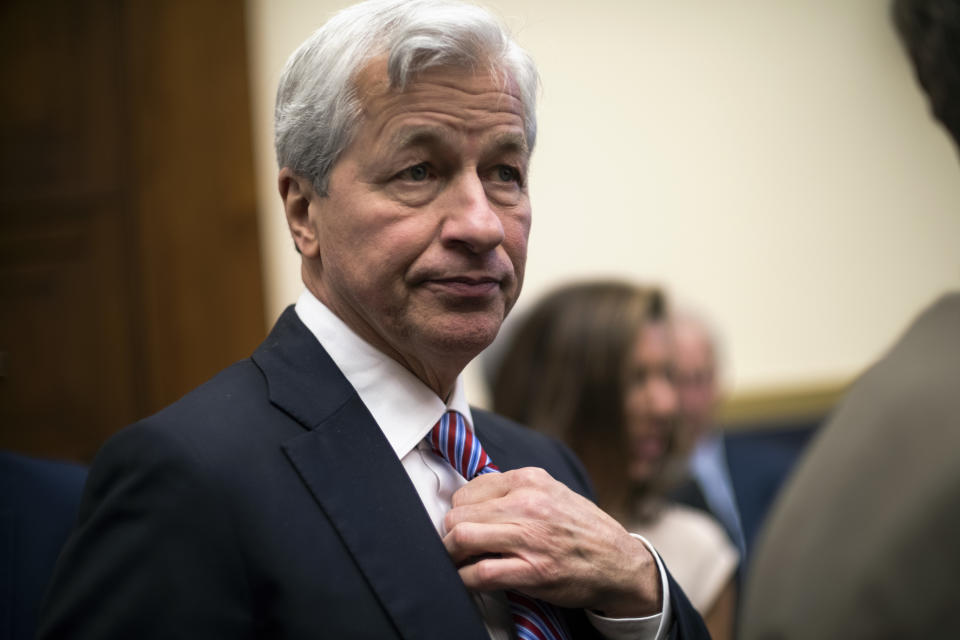CEO optimism falls for 7th straight quarter: survey
CEOs grew less optimistic about the U.S. economy for the seventh straight quarter, according to a new survey. On Wednesday the Business Roundtable released its CEO Economic Outlook survey for the fourth quarter.
The group’s economic outlook index decreased by 2.5 points to 76.7 — which remains below the Index’s historical average of 82.7. A 50-point threshold has historically indicated the onset of recession.
In a press release, the Business Roundtable said the latest reading suggests “continued moderation in the pace of economic growth.” The executives surveyed cited concerns about trade, slowing global growth and the contraction in manufacturing.
“There has been progress in several policy areas that has strengthened the U.S. economy from top to bottom—but more progress needs to be made on free and fair trade agreements. Such progress—combined with other policies that encourage growth, innovation and opportunity—will better serve all Americans and put the U.S. economy on a stronger and more sustainable path,” said JPMorgan Chase CEO and Business Roundtable Chairman Jamie Dimon.

Executives are closely watching the trade war with China. A new round of tariffs could go into effect in just days, if negotiators don’t make progress on a Phase 1 deal.
In a briefing with reporters, Dimon said the tariffs would likely have a small direct effect on economic growth, but “the real issue is the indirect effect: what happens to people’s psyche and confidence and businesses — and those things we don’t really know, but they wouldn’t be a positive.”
“Tariffs are a tool. Not one we would have used, but I’ve heard from Chinese officials that it actually did bring them to the table,” Dimon said.
Long-term effects of trade war
Dimon said he expects there will be a Phase 1 deal, but reaching further agreements could be difficult.
When asked if the final result would be worth the short-term price of the trade war with China, Dimon said it’s not clear yet.
“The issues have to be resolved. So right now you see some of the negative effect of the negotiations. We don’t know the ultimate outcome,” said Dimon. “We don’t yet. It’s not done yet. We’ll know in five years.”
In their first estimate of U.S. GDP growth for the year ahead, CEOs projected 2.1% growth in 2020. Last quarter the group predicted 2.3% growth for 2019. Dimon predicted global growth of about 3% in 2020, but added the “self-inflicted fly in the ointment” could be trade.
“Free and fair trade agreements are vital to economic prosperity for American workers, families and communities. Nearly 39 million American jobs—one in every five—depend on international trade. Because growth in trade-dependent jobs far outpaces job growth as a whole, we urge lawmakers to engage in more trade agreement negotiations and enact trade policies that preserve and strengthen an important pillar of the American economy,” said Lance Fritz, Chairman and CEO of Union Pacific in a statement.
The Business Roundtable conducted the survey before negotiators announced a deal between House Democrats and the Trump administration to update the North American Free Trade Agreement.
Dimon, Fritz and Joshua Bolten, CEO of the Business Roundtable, praised negotiators for striking a deal on USMCA and urged lawmakers to pass it quickly.
While the group supports the overall deal, they did express concerns about certain provisions of the modified agreement.
“We are very disappointed that the deal announced yesterday removes or weakens important intellectual property protections and could undermine lifesaving innovations and technologies,” Bolten said.
The group also has questions about how an “untested new enforcement mechanism” on labor provisions will work, Bolten said.
“We’ve very encouraged that there’s been an agreement. We do owe a debt of gratitude for the hard work that Trade Rep Lighthizer, Speaker Pelosi, Chairman Neal and their counterparts in Canada and Mexico have represented,” Fritz said. “That’s very much top of mind for us. We recognize the compromises that were required to get here.”
Future sales, hiring
The Business Roundtable index showed the executives’ plans for hiring and capital investment slowed in the fourth quarter, but sales projections picked up.

Of the 140 executives surveyed in the fourth quarter, 64% expect their company’s sales to increase over the next six months — up from 61% last quarter. Over the next six months, 32% of CEOs expect to increase capital investment, down from 36% in the third quarter. Forty percent of CEOs expect to increase hiring in that same time period, down from 43% last quarter.
The Business Roundtable says the sub-indices showing plans for sales and capital investment fall lower than the historical average, but the hiring sub-index is higher than the historical average.
“CEOs are justified in their caution about the state of the U.S. economy. While we have achieved a competitive tax environment, uncertainty surrounding trade policy and slowing global growth are creating headwinds for business. Lawmakers should expand, not restrict, trade to help boost U.S. economic potential,” said Bolten in a statement.
Forty-eight percent of CEOs said the greatest cost pressure facing their company was labor, which the group said reflects “strong real wage growth for U.S. workers and a healthy U.S. job market.” Fourteen percent of executives said the top cost pressure was regulations and 11% said materials.
The survey was conducted between Nov. 14 and Dec. 3.
Jessica Smith is a reporter for Yahoo Finance based in Washington, D.C. Follow her on Twitter at @JessicaASmith8.
Read more:
CEO optimism weakens on global growth, trade concerns: survey
CEO optimism drops for fifth straight quarter: survey
Lawmakers want to penalize companies for ‘outrageous’ CEO pay
GOP congressman: Americans, lawmakers are 'waking up' to China threat
Rep. McHenry: Libra is 'strongly likely' to happen
Did Zuckerberg reassure Maxine Waters about Libra? 'Absolutely not.'
Follow Yahoo Finance on Twitter, Facebook, Instagram, Flipboard, LinkedIn,YouTube, and reddit.

 Yahoo Finance
Yahoo Finance 
